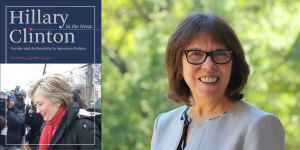Hilary Clinton'S Memoirs And The "Double Bind" Of Women In Politics
September 20, 2016

Shawn J. Parry-Giles uncovers contrasting styles and common themes in Hilary Clinton's political memoirs.
Taylor & Francis
"The memoir has long formed an important part of politicians’ careers, no more so when they are positioning themselves for a run to the highest level of office. Carnegie Mellon University’s David S. Kaufer and the University of Maryland’s Shawn J. Parry-Giles have reviewed Hillary Clinton’s two political memoirs: Living History (2003), spanning Clinton’s childhood through her years as First Lady, and Hard Choices (2014), recounting her tenure as Secretary of State. They reveal that while there are contrasts in narrative style between the two memoirs, a common theme is Clinton’s guardedness – which may mirror how she is perceived more generally as a politician in the forthcoming U.S. presidential election. The authors discuss their findings in a new study published in the Quarterly Journal of Speech, a National Communication Association journal.
"Traditionally, the two approaches to life writing are seen as the Plutarchian (Plutarch argued that memoirs should be confined to the leader’s performance in the public domain) and the Boswellian (James Boswell championed burrowing below the public domain and into the leader’s intimate thoughts). The authors discuss how Clinton changes from the Boswellian style in Living History, to the Plutarchian record of her term in office in Hard Choices, and how both memoirs feature additional Clinton identities that shed light on her strategies for a future presidential run and reveal the identity problems she has faced as a woman vying for the presidency.
"The differences between the approaches are more than ideological – they require radically different styles of writing, and the researchers believe they are fraught with additional challenges for female politicians. Clinton has been attacked for being too much of a “policy wonk” and not revealing enough about her personal life in her memoirs, but Kaufer and Parry-Giles argue that this is a by-product of the “double bind” women face in politics. The potential backlash means women in politics often find they can’t be too intellectual or too emotional; nor can they be too serious or too jovial.
"As the authors state:
"'Because of the constraints they live under, female candidates can find it difficult to inspirit the same level of passion in voters as their male counterparts. They must closely monitor their vocal qualities, their facial expressions, their intellectual displays, their clothing choices, their hair styles, and their emotional expressions. A woman candidate’s constant need to stay ‘correct’ places serious constraints on her ability to inspire. Because of the binds they face, it is easy for women candidates to be pushed back into pragmatism to remain ‘appropriate.’'
"The authors conclude that given this backdrop, it is unsurprising that Clinton seems personally guarded in her memoirs, and that she has struggled to write personally in the true Boswellian style, while also keeping her privacy under wraps. This perhaps explains her steepest political challenge – creating an identity that is authentic and trustworthy."
Read the full article at: http://www.tandfonline.com/doi/full/10.1080/00335630.2016.1221529

